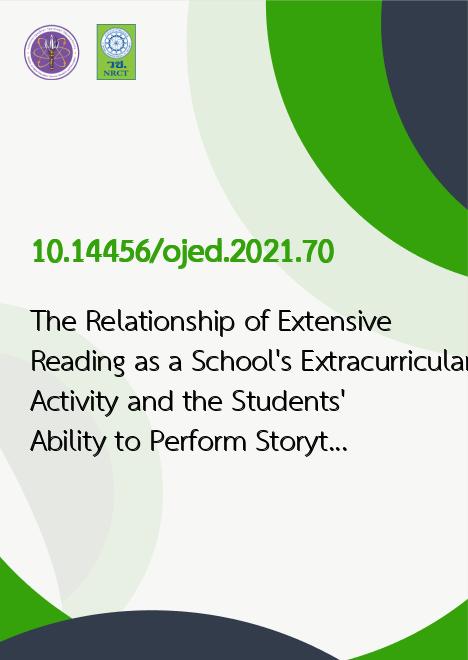
|
The Relationship of Extensive Reading as a School’s Extracurricular Activity and the Students’ Ability to Perform Storytelling in English: A Case Study of Phraharuthai Donmuang School |
|---|---|
| รหัสดีโอไอ | |
| Creator | Nipaporn Kamhanpon |
| Title | The Relationship of Extensive Reading as a School’s Extracurricular Activity and the Students’ Ability to Perform Storytelling in English: A Case Study of Phraharuthai Donmuang School |
| Contributor | Sumalee Chinokul |
| Publisher | Centre for Education Innovation, Print and Online Media |
| Publication Year | 2564 |
| Journal Title | An Online Journal of Education |
| Journal Vol. | 16 |
| Journal No. | 2 |
| Page no. | OJED1602054 (15 pages) |
| Keyword | extensive reading, extracurricular activity, storytelling in English |
| URL Website | https://so01.tci-thaijo.org/index.php/OJED |
| Website title | An Online Journal of Education |
| ISSN | ISSN 1905-4491 (Online) |
| Abstract | This study was to study the relationship of extensive Reading as a school’s extracurricular activity and the students’ ability to perform storytelling in English: A Case Study of Phraharuthai Donmuang School. This study aimed to 1) explore how extensive reading program can help enhance students’ performance in storytelling; and 2) investigate the strategies the students use to transfer what they read to spoken text in the storytelling. The case studies were three students chosen from the students from the first grade, fifth grade and ninth grade who participated in the reading club and won the storytelling contest 2014. And three English native and non-native speaking teachers who were the judges for the story telling contest 2014. The instruments used were: 1) semi-structured interview with the three cases to explore their perception and attitudes towards extensive reading and the comments from the story telling contest 2) semi-structured interview to explore the process of preparing the story, telling the story, and the tools for storytelling semi-structured interview to investigate the strategies the students use to transfer what they read to spoken text in the storytelling. The result found that extensive reading can enforce students to perform storytelling in English, and the strategies students used to transfer what they read to spoken text in the storytelling compose of translation, imagination; props like pictures, and dialogues. These strategies could enforce them to tell the story with confidence and accuracy. |